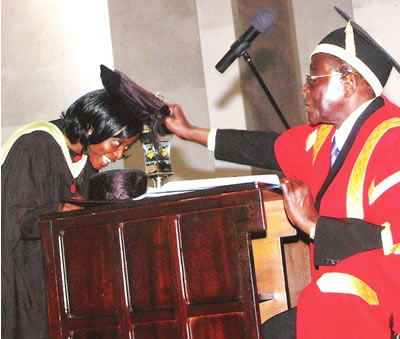Making Mugabe Laugh
Barely was Laurent Gbagbo, wearing a sweat-damp white tank top and a startled expression, prodded at rebel gunpoint from the bombed ruins of his presidential bunker in Ivory Coast, than Secretary of State Hillary Rodham Clinton announced this conclusion: His ejection, more than four months after he refused to accept electoral defeat, sent “a strong signal to dictators and tyrants throughout the region and around the world. They may not disregard the voice of their own people in free and fair elections, and there will be consequences for those who cling to power.”
Zimbabwe’s 87-year-old president, Robert Mugabe, who began his 32nd year in power this week, must have chortled when he heard that one.
The parallels between Ivory Coast and Zimbabwe are striking: both were once viewed as the singular successes in their respective regions, the envy of their neighbors. Both Mr. Gbagbo, a former history professor, and Mr. Mugabe, a serial graduate student, are highly educated men who helped liberate their countries from authoritarian regimes.
Both later clothed themselves in the racist vestments of extreme nativism. Mr. Gbagbo claimed that his rival Alassane Ouattara couldn’t stand for president because his mother wasn’t Ivorian; Mr. Mugabe disenfranchised black Zimbabweans who had blood ties to neighboring states (even though his own father is widely believed to have been Malawian).
The two countries have also been similarly plagued by north-south conflicts. And when they spiraled into failed statehood, both leaders blamed the West, in particular their former colonial powers – France and Britain – for interfering to promote regime change.
Finally, the international community imposed sanctions against both countries, including bans on foreign travel and the freezing of bank accounts that have largely proved insufficient.
But here’s where the stories crucially diverge – why Laurent Gbagbo is no longer in power, while Robert Mugabe, who lost an election in 2008, continues to flout his people’s will.
The most important point of departure was the sharply contrasting behavior of regional powers. The dominant player in West Africa, Nigeria, immediately recognized the validity of Mr. Ouattara’s victory in United
Nations-supervised elections, and worked within the regional alliance, the Economic Community of West African States, to unseat the reluctant loser. But Zimbabwe’s most powerful neighbor, South Africa, played a very different role. Instead of helping to enforce democracy, it has provided cover for Mr. Mugabe to stay on.
Partly this is due to what is called “liberation solidarity.” Most of the political parties still in power in southern Africa were originally anti-colonial liberation movements – like those in South Africa, Mozambique, Namibia and Angola – and they tend to abhor the aura-diminishing prospect of seeing any of their fellows jettisoned.
It is also because South Africa eyes the Zimbabwean opposition – which morphed out of a once-loyal trade union movement – through the suspicious lens of its own trade union movement’s contemplation of opposition politics.
As a result, instead of supporting the Zimbabwean opposition in 2008, Thabo Mbeki, then the South African president, bullied it into a power-sharing government of national unity headed by Mr. Mugabe. This democracy-defying model has threatened to metastasize into the mainstream of African politics; that same year it was also applied to Kenya, where a unity government was set up to end post-election bloodshed. When Mr. Mbeki was deputized by the African Union to broker a solution in Ivory Coast, that was the Band-Aid he reached for – but it was rightly rejected by Mr. Ouattara.
Of course, the other crucial difference is that in Ivory Coast, the dictator’s ejection came at the hands of men with guns. The northern rebels moved on Abidjan. The United Nations peacekeepers, trussed by restrictive mandates as always, nevertheless protected Mr. Ouattara until the French expanded an airport-securing operation into something altogether more ambitious. They basically prized Mr. Gbagbo from his bunker, though to avoid bad postcolonial optics, they brought the rebels in to make the final move.
In contrast, for refusing to plunge the country into a civil war, Zimbabwe’s democratic opposition has been rewarded by the international community by being largely ignored.
Next month, a group of southern African nations will discuss Mr. Mugabe’s continued resistance to agreed-upon reforms intended to pave the way to free elections. Either South Africa must get Mr. Mugabe to honor them, or it must withdraw its support for him. If it won’t, then the international community needs to push South Africa out of leading the negotiations, and engage more directly.
Zimbabweans need help if their voices are to be heard. If the United States wants to prove that Mrs. Clinton’s words were more than empty rhetoric, it should begin by pressuring South Africa. Otherwise Zimbabwe’s hopes for freedom will founder, even as Ivory Coast regains its stolen democracy.
Peter Godwin is the author of “The Fear: Robert Mugabe and the Martyrdom of Zimbabwe.”
Source










